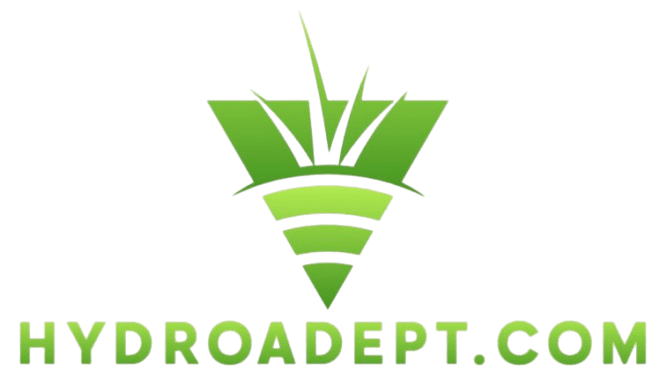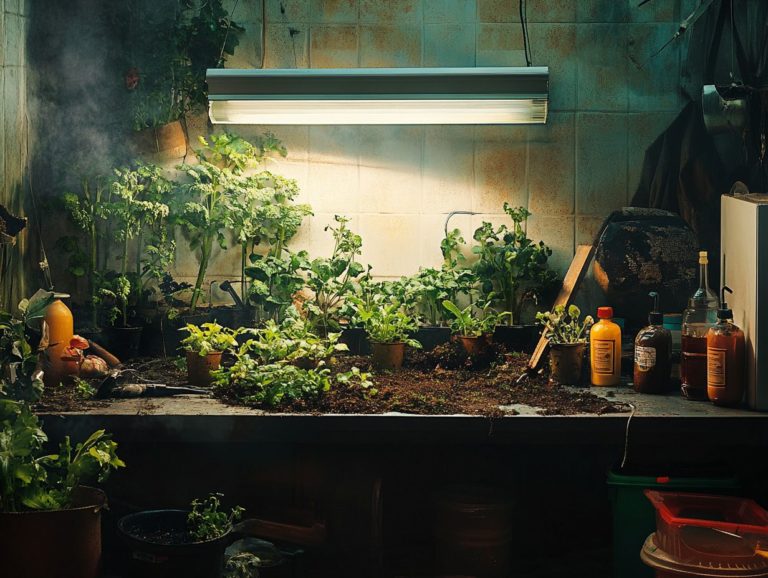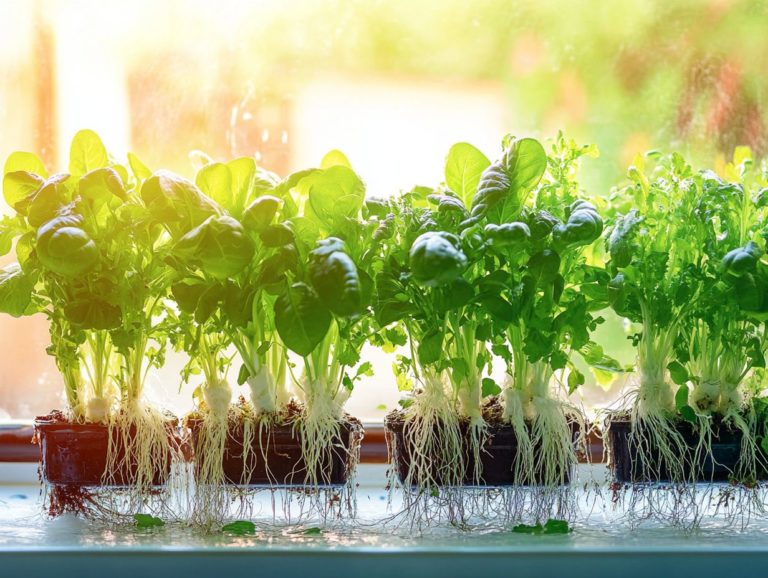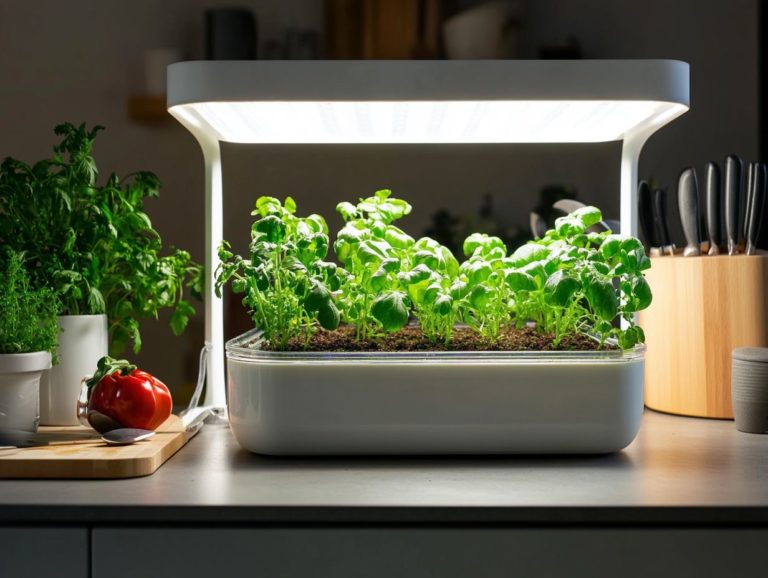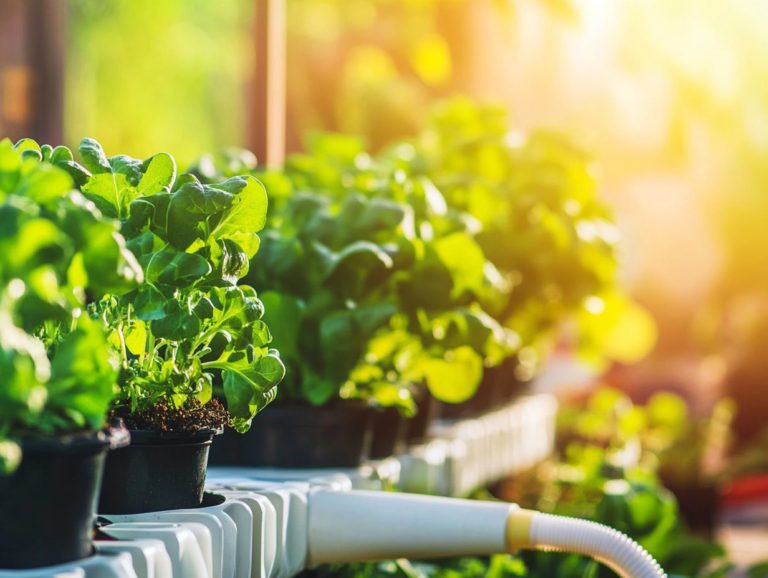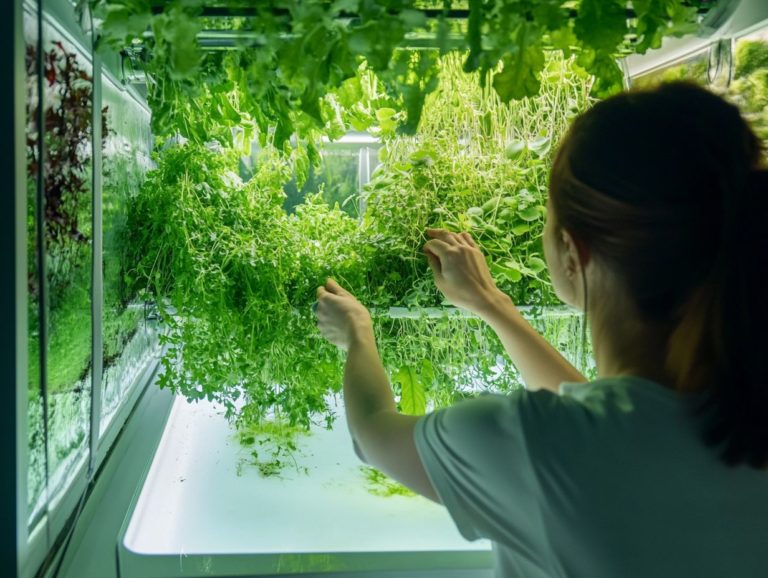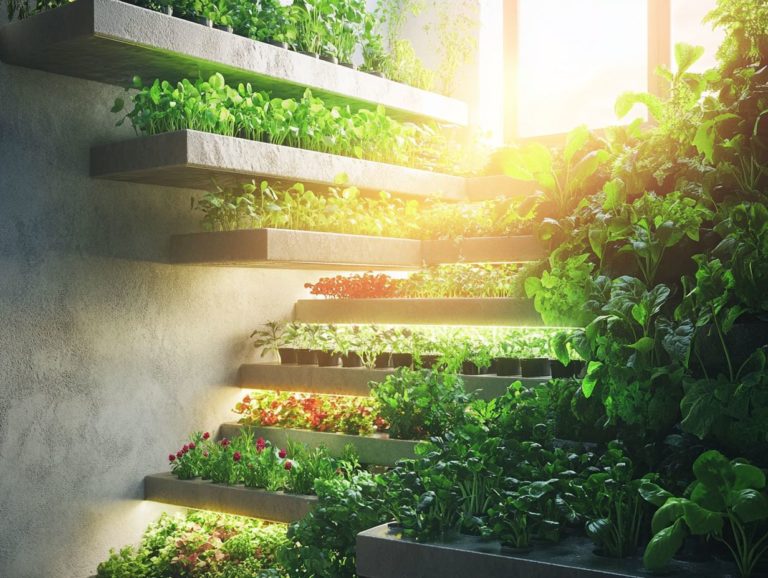What Are the Challenges of Hydroponic Gardening?
Get ready! Hydroponic gardening is changing how we grow food forever, providing a soil-less alternative that flourishes in meticulously controlled environments.
Hydroponics offers many benefits, like faster growth rates and less water usage. Yet, it also comes with challenges. You must manage nutrient levels carefully and stay vigilant against potential system failures, as navigating obstacles like pest infestations is part of the hydroponic gardening experience.
This article delves into the key advantages of hydroponic farming, the common difficulties you might encounter, such as waterborne diseases, and practical strategies to help you overcome them. This ensures your gardening journey is both fruitful and rewarding.
We will also explore alternative methods such as vertical farming and crop rotation to broaden your gardening options.
Contents
- Key Takeaways:
- Benefits of Hydroponic Gardening
- Challenges of Hydroponic Gardening
- Overcoming Challenges in Hydroponic Gardening
- Alternative Solutions to Hydroponic Gardening Challenges
- Frequently Asked Questions
- What are the challenges of hydroponic gardening?
- Can hydroponic gardening be more expensive than traditional gardening?
- What are the advantages of using hydroponic gardening?
- Do hydroponic gardens require a lot of maintenance?
- What types of plants can be grown using hydroponic gardening?
- Is it difficult to set up a hydroponic garden?
Key Takeaways:
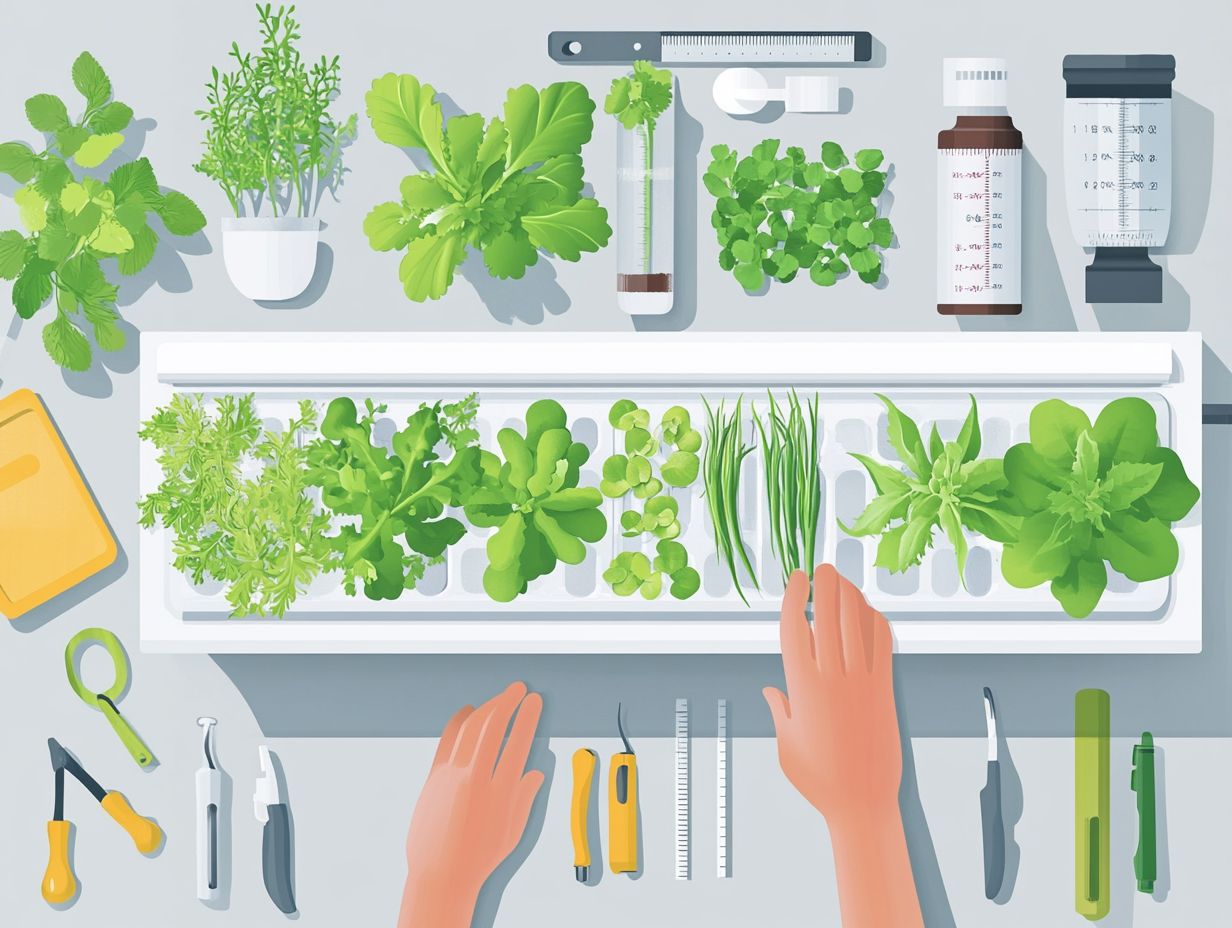
- Hydroponic gardening offers numerous benefits over traditional gardening, but it also comes with its own set of challenges, including maintaining proper nutrient levels and addressing soil-borne diseases.
- Common obstacles in hydroponic gardening include controlling pests and diseases, and managing the environment for plant growth.
- Success in hydroponic gardening requires careful planning, attention to detail, and effective strategies like regular monitoring, adjusting nutrient levels, and implementing pest management techniques.
What is Hydroponic Gardening?
Hydroponic gardening is a groundbreaking method that allows you to grow plants without soil, using a nutrient solution to deliver essential minerals directly to the roots. This hydroponics system is particularly effective in urban gardening.
This innovative technique boosts plant growth and enhances yield, making it ideal for addressing food shortages. It s no wonder this approach is gaining momentum in urban settings, promoting more sustainable food production while significantly reducing the risks associated with soil-borne diseases and water pollution that often plague traditional farming methods.
When diving into hydroponics, you’ll encounter both passive systems and active systems that are essential to understanding effective agricultural practices. Passive systems harness capillary action to draw the nutrient solution to the plants, while active systems utilize pumps to ensure a steady flow of nutrients.
The advantages of hydroponic gardening are impressive. You can produce high-quality food bursting with flavor and nutrients while cutting water usage dramatically—often by up to 90% compared to conventional gardening methods. However, it’s important to be aware of common hydroponic gardening myths that may mislead you.
With the ability to control environmental factors such as light, temperature, and humidity, you can create ideal conditions for plant growth year-round, thus enhancing nutrient availability. This versatility makes hydroponics an increasingly appealing choice for those seeking sustainable solutions in a climate influenced by climate change.
Benefits of Hydroponic Gardening
Hydroponic gardening presents a wealth of advantages that outshine traditional farming methods, making it a remarkable option for sustainable food production particularly in urban settings where space is often at a premium and crop diversity is essential.
This cutting-edge agricultural practice promotes a diverse range of crops and facilitates year-round growing conditions, leading to significant yield improvements while effectively reducing the risks of water pollution and pest infestations.
Embracing hydroponics means embracing a greener, more efficient future for food cultivation through innovative farming techniques.
Start your hydroponic journey today and grow your own fresh produce effortlessly!
Advantages Over Traditional Gardening
The advantages of hydroponic farming over traditional gardening are truly remarkable. They enhance agricultural practices in our communities. You benefit from improved nutrient availability for your plants, a reduced reliance on pesticides, and enhanced control over growing conditions, which are crucial for maintaining sanitation practices. This combination results in healthier plants and increased yields.
Unlike soil-based gardening, hydroponics allows for deep root growth and efficient water consumption. This makes it especially advantageous in regions facing food shortages and promotes sustainable practices. However, it’s important to consider the disadvantages of hydroponic gardening as well.
Hydroponic systems significantly reduce pest infestations by creating an environment less inviting to traditional predators that thrive in soil. This enhances the overall quality of plant health and leads to superior sanitation practices, greatly minimizing the risk of pathogens, particularly in hydroponic garden setups.
By carefully managing water and nutrient flows in hydroponics, you not only maximize growth potential but also conserve resources. This allows for up to 90% less water usage compared to conventional gardening methods that contribute to environmental control. The absence of soil lowers the chances of soil-borne diseases, making hydroponics a cleaner and more sustainable choice for modern agriculture, particularly in urban areas. If you’re starting out, be sure to check out what tools you need for hydroponic gardening.
Challenges of Hydroponic Gardening
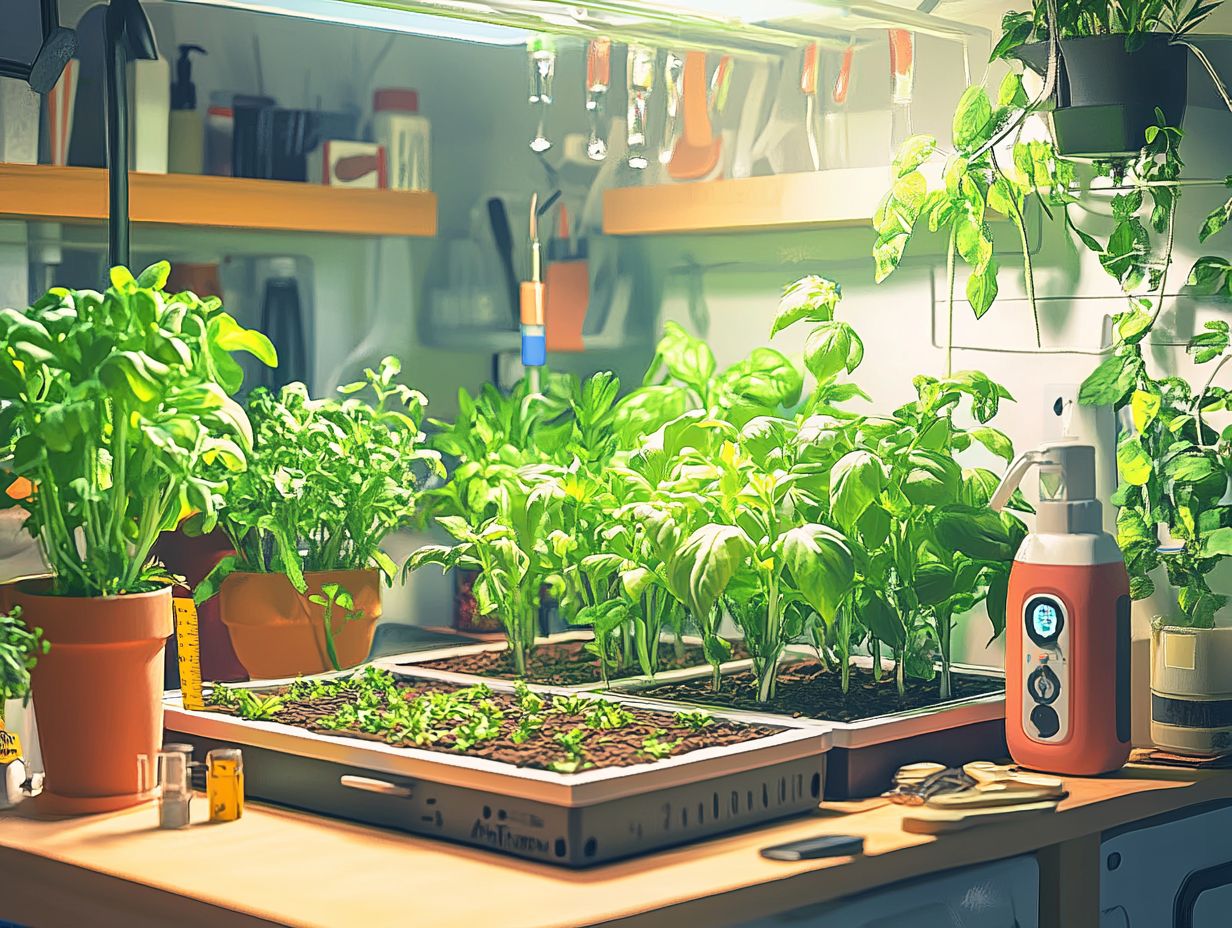
Despite its many advantages, hydroponic gardening presents a set of challenges that can impede your success. These challenges include mold growth and nutrient solution management. You may encounter common obstacles like pest infestations, waterborne diseases, and plant leaf issues that threaten the health of your plants.
Issues such as leaf problems, root rot, and the necessity for vigilant maintenance can complicate your hydroponic journey, especially if you’re just starting out with hydroponic seeds. Embracing these challenges with knowledge and patience will be key to thriving in this innovative gardening method. To understand more about the advantages, explore what are the benefits of hydroponic gardening, which can lead to superior crop management.
Common Obstacles and Difficulties
Common obstacles in hydroponic gardening can take a toll on your plant health and yield. Issues such as root rot, mold growth, and improper temperature control are among the most frequent culprits affecting growing media.
Understanding the ability of water to conduct electricity, known as electric conductivity (EC), is essential for ensuring that your plants absorb nutrients effectively. This helps avoid deficiencies that compromise crop quality and ultimately affects nutrient concentration.
These challenges often stem from inadequate maintenance and a lack of understanding regarding nutrient solution management. For instance, root rot can easily develop in over-saturated growing mediums, hindering nutrient absorption and stunting plant growth, particularly in passive systems. To avoid such pitfalls, it’s important to know what common mistakes to avoid in hydroponics. Regularly checking moisture levels can help you combat this issue, as it is crucial for maintaining optimal growing techniques.
Mold growth is another concern, especially in high-humidity environments that can affect overall plant health. Utilizing dehumidifiers or enhancing air circulation can significantly reduce its presence and improve sunlight exposure. Temperature control plays a pivotal role; excessive heat can stress your plants, leading to wilting or halted growth, thereby affecting overall yield improvement.
Keep your plants thriving by maintaining the ideal temperature range and frequently checking the nutrient solution balance including pH levels. This will foster better plant health and enhance the sustainability of your hydroponic practices, especially in urban gardening setups.
Overcoming Challenges in Hydroponic Gardening
Navigating the challenges of hydroponic gardening demands a refined approach. This approach emphasizes effective tips and strategies centered around pest control, optimizing nutrient uptake, and fostering plant health in diverse environmental conditions, vital for maintaining crop diversity.
By embracing best practices for diligent maintenance and gaining a clear understanding of organic certification requirements, you can achieve successful crop management. Cultivating high-quality food with confidence enhances your hydroponic garden’s reputation.
Start your hydroponic journey today and reap the benefits of sustainable gardening!
Tips and Strategies for Success
Effective tips and strategies can elevate your chances of success in hydroponic gardening. Focus on crop management, optimal growing techniques, and the right hydroponic supplies, like an herb garden kit for cozy spaces.
Prioritize proper sanitation and diligently monitor environmental factors, such as temperature control and moisture levels, to establish a flourishing hydroponic ecosystem.
A particular area that demands your attention is electrical conductivity and nutrient concentration. Electrical conductivity measures how well a solution can conduct electricity, indicating nutrient levels in your water. These elements directly impact plant growth and yield, ultimately optimizing nutrient solution management.
Regularly checking pH levels and adjusting temperature creates ideal conditions for your plants to thrive through optimal absorption and respiration, essential for maximizing yield improvement.
Maintaining a monitored schedule for these checks simplifies the process and allows you to make timely adjustments, resulting in healthier plants and better crop management.
Employing a comprehensive feeding regimen tailored to your plants nurtures robust growth and enhances their flavor profiles. This meticulous attention to detail is essential in hydroponics and sustainable food initiatives.
Alternative Solutions to Hydroponic Gardening Challenges
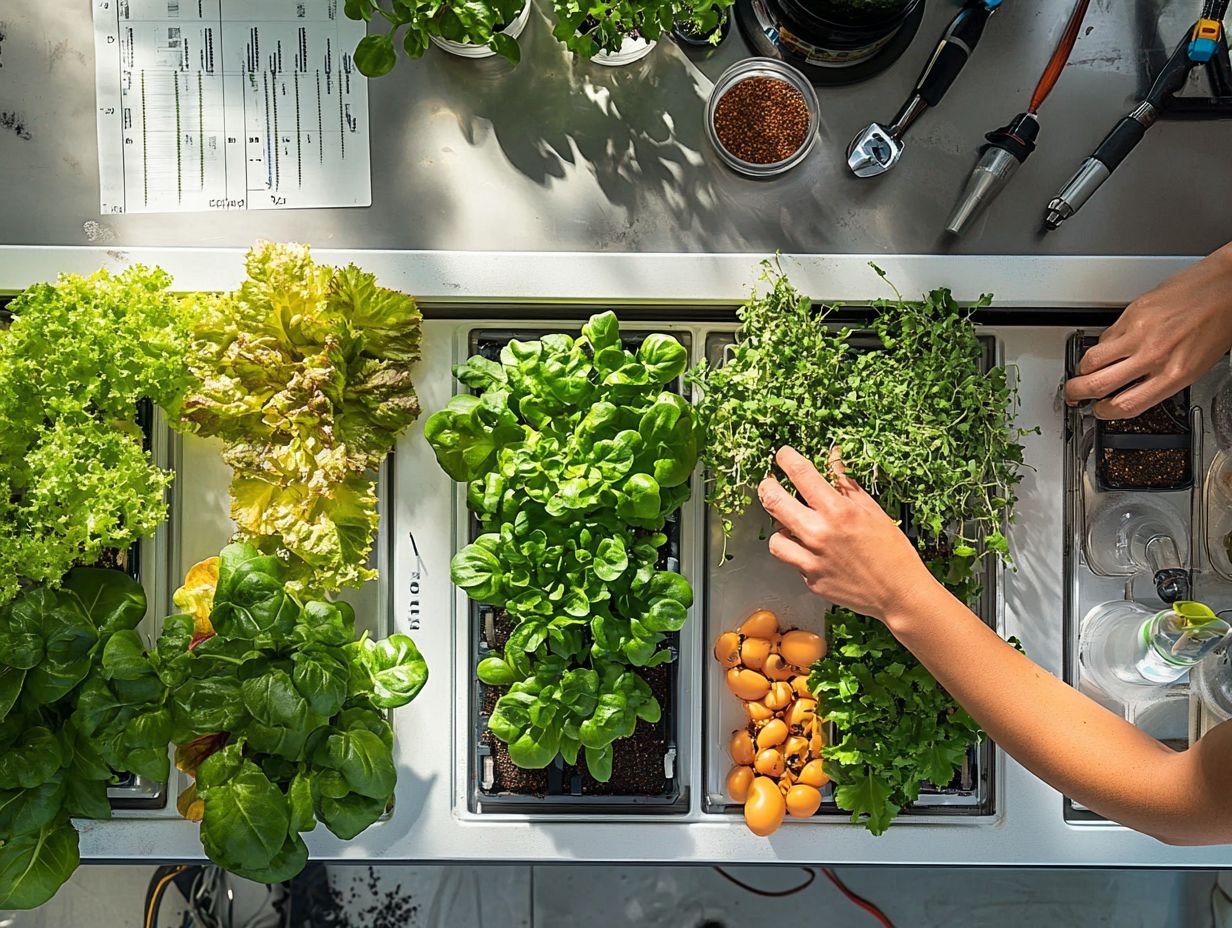
When you encounter the challenges of hydroponic gardening, exploring alternative solutions like vertical farming can provide invaluable insights into effective farming techniques.
Consider options like vertical farming and other sustainable practices that either complement or offer alternatives to traditional hydroponics, enhancing your overall gardening experience. By evaluating various approaches, you can discover methods that align perfectly with your unique needs and available resources.
Exploring Other Gardening Methods
Exploring various gardening methods can expand your skills and enhance your hydroponic experience. Dive into traditional gardening, permaculture, and innovative crop rotation techniques to discover new practices!
For example, traditional gardening fosters a profound connection with the soil and promotes organic farming principles through natural inputs and crop diversity, which can bolster resilience against pests and diseases. In contrast, permaculture emphasizes creating self-sustaining ecosystems, requiring a substantial initial investment of time and effort.
Innovative crop rotation techniques can help maintain soil health and improve nutrient availability, although they may not produce results as quickly as hydroponic systems.
Examine these diverse approaches to appreciate the strengths and weaknesses of each method. This knowledge empowers you to choose the best fit for your gardening goals!
Frequently Asked Questions
What are the challenges of hydroponic gardening?
The challenges of hydroponic gardening include maintaining proper nutrient levels, preventing algae growth, and managing equipment malfunctions. Regular monitoring and sanitation practices are essential to avoid issues like root rot and mold growth.
Can hydroponic gardening be more expensive than traditional gardening?
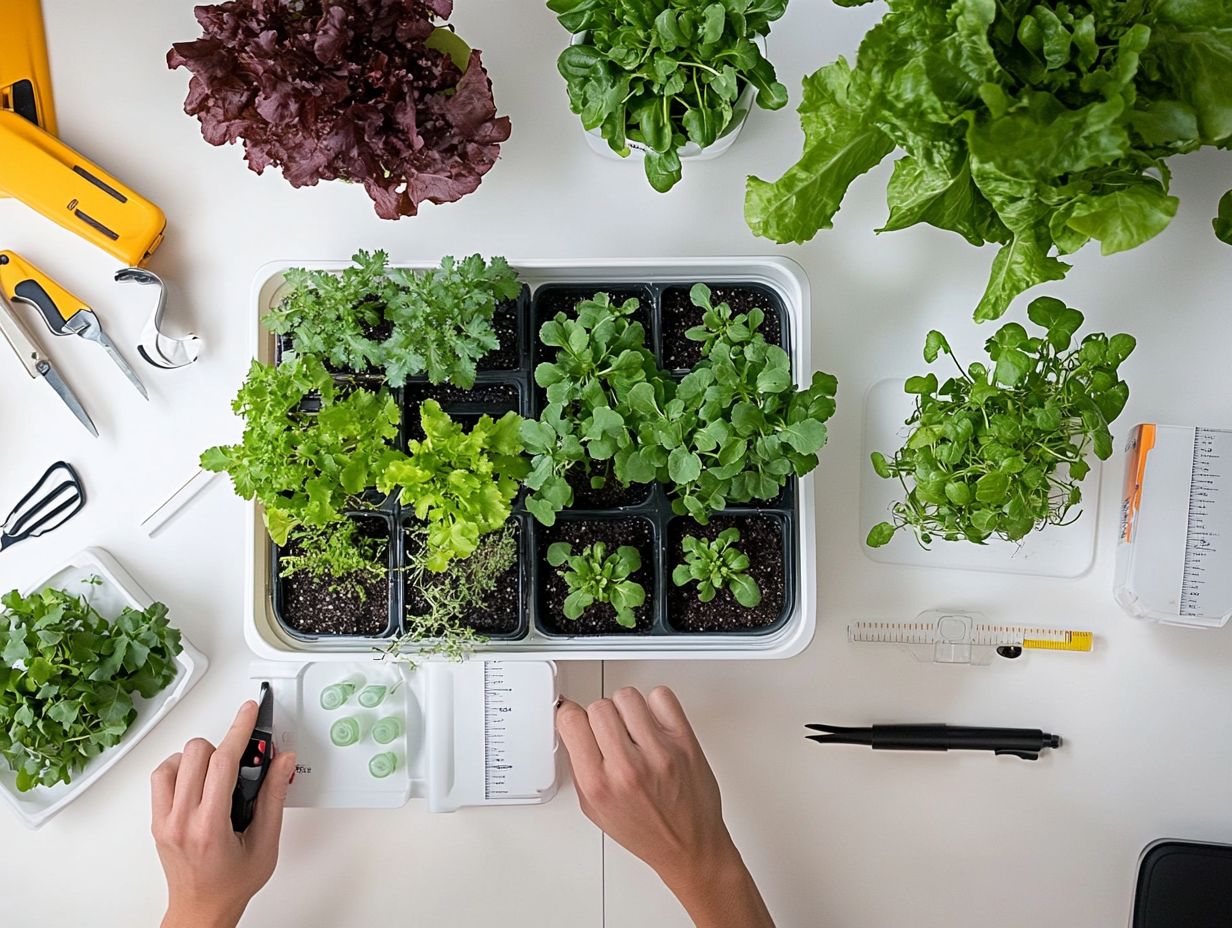
The initial setup for a hydroponic garden can be more expensive. However, long-term costs may be lower because you won’t need soil or many traditional gardening tools.
This setup can lead to high-quality food production while minimizing water pollution.
What are the advantages of using hydroponic gardening?
Hydroponic gardening lets you grow plants year-round. It makes the best use of space and often produces higher yields than traditional methods.
You can accurately manage nutrient levels and sunlight exposure, while also reducing pest control issues.
Do hydroponic gardens require a lot of maintenance?
Absolutely! Hydroponic gardens need regular care to monitor nutrient levels, prevent pests, and ensure equipment is working well. You ll check how well electricity moves through the water and manage temperature, similar to farming systems but without soil.
What types of plants can be grown using hydroponic gardening?
You can grow almost any plant with hydroponics, including vegetables, fruits, herbs, and flowers. Herb garden kits are great for beginners!
You can also use hydroponic seeds to target specific plant growth.
Is it difficult to set up a hydroponic garden?
Setting up a hydroponic garden can be more complex than traditional gardening. With the right research and help, anyone can do it.
Understanding different growing systems and their benefits is key for success, especially in vertical farming setups.
